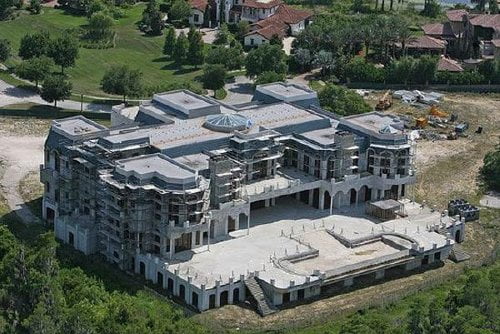The Queen of Versailles

David Siegel made a fortune with Westgate Resorts that earned him the title of the Time-share King. Then he met his third wife months after divorcing his second. Jackie was a former beauty queen thirty years his junior who presented him with seven children and an adopted niece in quick succession. 'Bursting at the seams' in their 26,000 square foot home, the two began to build the largest mansion in America, a 90,000 square foot behemoth based on the palace of France's Sun King. Then 2008's economic crisis came and everything changed for the woman who would be "The Queen of Versailles."
Laura's Review: B+
Lauren Greenfield, an LA based photographer with one feature documentary under her belt, met Jackie Siegel as a customer of Donatella Versace's at a fashion shoot, heard about the house and decided to make a feature film about it. She filmed over the course of two years and ended up with a very different story than the one she set out to tell. It is difficult to know if Greenfield was going to paint an admiring portrait of the Super Rich or pen an essay on vulgar excess, but what she ultimately created falls somewhere in between.
David Siegel seems like a decent guy with down to earth values and a hard work ethic. Greenfield gives us his background as a Florida landowner of no particular wealth who was approached by a time-share developer to sell. Instead he took the idea and ran with it himself, building his empire to 28 resorts in 11 states. Jackie also isn't the trophy wife she may initially appear to be, having gotten a degree in computer engineering and a job at IBM in her home town of Binghamton, NY before the remark of a soul-drained coworker made her quit and run to the city to take up a more glamorous life modeling.
But Siegel does bend reality to suit his perception of himself, alternating between being a legend in his own mind with claims of having gotten George W. elected and a victim of greedy bankers just like everyone else (Jackie, obviously parroting her husband, at one point demands to know where the bailout money went that was supposed to go to 'people like us,' but she stumbles on the words as they trip out of her mouth). And yet his company was perpetuating the same myth as those banks - that anyone could own something beyond their means - and he's selling the equivalent of a mortgage fifty times for every unit.
Still, one of Greenfield's biggest accomplishments is how likable her subjects remain, despite the depictions of crass displays of wealth and cringe-worthy pet ownership. As David sits in his TV room working and complaining about his family's disregard for utility usage and his wife's inability to stop spending money, we see Jackie trying to help Westgate's ex employees with their own warehouse store of heavily discounted merchandise and a friend back home whose house has been foreclosed on. But there are always those contradictions with these two. A Filipino nanny is grateful for being 'given' a concrete playhouse to use as her own, the type of home her father dreamed of and never had, but cries thinking about the children she hasn't seen in twenty years. Wouldn't a long time faithful employee been granted a trip back home when the Siegels weren't worrying about money? Then there's Jackie's behavior at Christmas, when she wheels four carts laden with toys out of Walmart and throws an open house like it's pre-2008. (It's hard to tell whether this Versace customer's patronage of Walmart is a cost cutting gesture - Jackie takes a stretch limo to MacDonald's.)
Still, wrestling with having to sell their unfinished Versailles, Jackie states that if they have to buy a 'normal' $300,000 house with four bedrooms, she'd deal with it and just get bunches of bunk beds. And we believe her. More troubling is David's honesty in answering whether he feels supported by his wife whom we learn he's shielded from the worst of the financial news - he says no. Then again, after two years of having a documentary crew around, he's obviously in the mood to wrap things up. (David is suing the Sundance Institute for defamation based on the 'riches to rags' description of the film, even though he says that very thing to Greenfield's camera. Jackie attended the premiere at the festival with the filmmaker.)
"The Queen of Versailles" has a lot to say about the American Dream gone morally bankrupt, a land where too many grab for ostentatious wealth rather than the more modest things that used to make Americans happy. But the Siegels aren't the ogres we might expect either - Greenfield entertains us while letting us draw our own conclusions.

